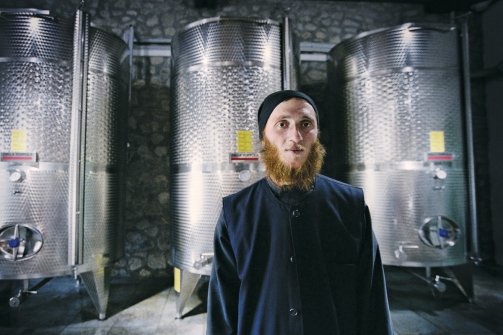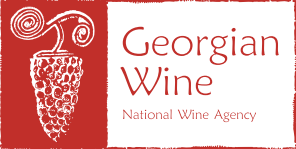
by Anna Nemtsova
Georgian wines—including Stalin’s favorite red—are making a comeback after a Russian embargo dried up business.
On a weekend last fall, a thick cloud of aromas hung over the cobblestone square outside Svetitskhoveli Cathedral in Mtskheta, the historic capital of Georgia. Long homemade loaves of bread and twisted salty cheeses lay beside meat dumplings and barbecued veal shashlik. Bottles of ruby-, gold-, and amber-colored wines twinkled in the gentle sunshine, on display for crowds of visiting wine lovers. Tourists praised Georgian hospitality in English, French, and Chinese. “This is a wine heaven,” said Conor Mills, an entrepreneur from London who was in town for the Rtveli festival, the traditional celebration of the harvest, when Georgian winemakers descend into their cellars to uncork bottles and terra-cotta amphorae to throw the most generous of feasts.
The festival celebrated the entire wine geography of Georgia—from the regions of Kakheti, Imereti, and Kartli to the highlands of Racha and seaside Guria—and spirits were high. Georgian wine has been slowly creeping onto the radar of global oenophiles: in 2011 the country exported wine to 48 other nations, a 30 percent increase since 2007, and winemakers had a great harvest last autumn, which nearly doubled the volume of wine produced in 2012. To fete their good fortune, farmers performed polyphonic songs and gave long, emotional toasts about the recovery of Georgian winemaking. After all, it was close to drying up just a few years ago.
Georgian wine became the first, symbolic victim in the mid-decade conflict between Moscow and Tbilisi. In 2006 Russia declared the quality of Georgian wine to be unacceptably poor and banned all imports from the country. Russians who missed the earthy taste of a good Saperavi, the refreshing zing of a Tsinandali, or the velvety, raspberry notes of a choice Khvanchkara (Stalin’s personal favorite) had to smuggle in Georgian wine from Ukraine, Azerbaijan, or Belarus. Into the void, cheap Chilean merlot and sauvignon quickly filled the vacant shelves of Russian wine stores.
The embargo nearly destroyed Georgian winemakers. That year, they had already produced nearly 68 million bottles for Russian consumption, an amount that constituted close to 90 percent of the country’s exported wine. The biggest exporter, Telavi Wine Cellar, laid off dozens of workers. But other winemakers, such as Badagoni, Tbilvino, and Kindzmarauli Marani, took the dire moment as an opportunity to innovate and update their outdated methods. They thumbed their noses at the embargo, declaring their product to be “freedom wine.” They built modern wineries, replacing Soviet-era metal barrels and corroded cisterns with the best Western equipment. They also invited French and Italian experts in to consult on how to turn Georgia into a paradise for wine tourists.
Their foresight has paid off handsomely: in 2011 wine-related tourism was up 39 percent from the year before. The scenery and architecture of Georgia’s wine country recall Tuscany, but with fewer tourists and far cheaper restaurants. Ancient monasteries dot the landscape—former wineries themselves, where bishops concocted a sacramental wine called Golden Road. A new highway, lined by sycamores and scarlet vines, cuts east to west through the most famous wine region, Kakheti.
Following this road, a visitor can stop and sample Georgia’s distinctive and delicious bottlings, from the fruity Alaverdi Traditional and Mtsvane’s Chateau Mukhrani—with hints of white plum and blackberry—to the floral Kakheti Noble. The reds pair perfectly with Kakheti’s traditional churchhella candies, made from grape juice, walnuts, and flour. At the Khareba winery in Kvareli—with a luxurious seven-floor restaurant and hotel converted from a former Soviet factory deep in the Kakheti mountains—a veranda allows visitors to take in the view of vast vineyards and to recite a traditional Georgian toast: “With this small glass and a big soul, let us drink to those who are not here to enjoy this beauty with us.”
Farther along the road, one happens upon the 11th-century Alaverdi Monastery, where bishops serve an amber-colored wine produced in giant subterranean amphorae. Also nearby is Jean-Jacques Jacob’s bakery. The boulanger moved here from France five years ago, eager to learn the secrets of Georgia’s traditional sourdough bread. Wine tasting is free year-round at many Kakheti households—residents in the region usually have a personal marani, or wine cellar, where they store an average of 450 liters per person—and at the bigger wineries, which look like glass-and-steel UFOs perched on the snowy peaks of the Caucasus.
The structures are striking, especially considering that as recently as 2003, all a tourist could find outside the regional capital, Telavi, were a few dim sheds where local babushkas in plastic aprons scrubbed bottles with worn-down brushes and filled them with rich, yeasty wine (supplied to the sheds via rubber hoses that snaked through muddy puddles). Now, less than a decade later, the new Kindzmarauli Marani factory is the epitome of modernity, with shiny Della Toffola equipment and an international clientele. The factory exports 2 million bottles of dry and semisweet wine per year, priced between €15 and €20 per bottle, to Ukraine, China, Poland, Canada, the U.K., Belarus, and the U.S. A few miles away, the Badagoni factory—a joint Georgian-Italian operation—is an architectural marvel, and exports 18 types of wine to 12 European countries.
These days Georgian winemakers thank Russia’s embargo for inspiring them to improve their methods. But most say they’d be happy to return to the Russian market, although with an eye for quality rather than mass-produced cheap wine. “If Russians wait for two to three years before lifting the embargo, all our best wines will go to China, Canada, Europe, and the United States,” says Dmitry Lebanidze, the factory director at Kindzmarauli Marani. But unlike private producers, Georgian officials have no desire to return to the Russian market unless it undergoes big reforms. “Russia would be a step back,” says Bakur Kvezereli, the former minister of agriculture.
Anna Nemtsova is a correspondent for Newsweek and The Daily Beast based in Moscow. Her work has also appeared in The Chronicle of Higher Education, on Radio Free Europe and in Foreign Policy.
© Newsweek/www.thedailybeast.com






